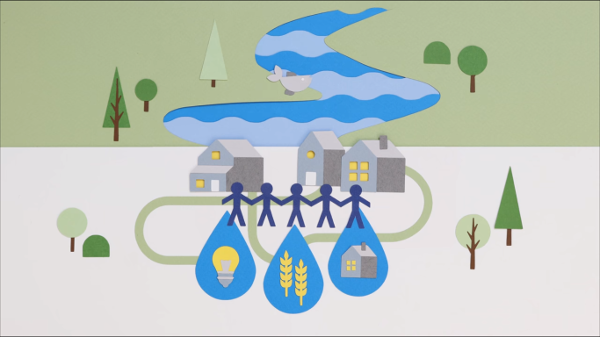Food, energy, and people are all linked by water. Decisions and actions in one area typically have impacts on one or more of the other sectors. There can be cascading impacts, both positive and negative, onto other parts of our society including the economy, our health, and even politics. These many connections are the reason why decisions in the Water Nexus are so complex.
Nexus connections can cross communities. For example:
Nexus connections can affect our economy. For example:
Nexus connections can have unexpected and unintended consequences:

Everyone and every sector in the Alberta Water Nexus shares a common water supply. This supply is limited, and quality and quantity vary on a year by year basis, making it especially important to plan in advance for how to share the water.
It can be challenging to ensure there is sufficient water for the environment, something we know benefits all sectors. A key tension in water management often arises when there are water shortages and the need to protect sensitive aquatic ecosystems becomes a priority over other uses. By ensuring legislation protects environmental flows to meet ecosystem needs, and only making ‘surplus’ water available for human uses, the ecosystems are maintained even during a drought or low-water situation.
Competing water demands can occur at any time, but let us consider an example during the summer months. The environment, which acts to clean our water and provide economic and recreational benefits, requires specific levels of high-quality water flows. The food sector requires water in the summer to irrigate crops. Municipal water demand for watering gardens and pools increases in the summer. Hydro power plants require large volumes of water in the summer to meet high electricity demand when air conditioning units are in use. But often there is less water flowing in the river due to low precipitation during the summer months. In times and areas of water shortage, these competing demands result in water management challenges and sometimes restrictions. In particularly low flow years, important decisions need to be made regarding which users get access to water.
Due to the complex and interconnected nature of the Nexus, a collaborative approach among major water users and stakeholders is necessary. Establishing and maintaining relationships between sector decision-makers is particularly valuable in times of water shortages, but may also result in leveraging opportunities that benefit multiple sectors.
Various levels of government and individual actions already manage the Water Nexus with various laws, systems, and strategies. For example:
There continue to be opportunities for better management, including:
The many connections in the Nexus make it challenging to balance, but this also offers many opportunities for cooperation and for strategies with multiple benefits. Balancing the Nexus is an ongoing process that does not have any straightforward solutions. Strategies to conserve water in one sector will likely have positive and, potentially, negative repercussions in other sectors. It is necessary to consider a broad range of perspectives to find ways to mitigate any negative impacts. Ultimately, these solutions will allow us to more sustainably manage our water resources.
We provide Canadian educational resources on water practices to promote conservation and sustainability. Our team crafts current and relevant content, while encouraging feedback and engagement.
The Canada WaterPortal is a registered charity, #807121876RR0001
We recognize and respect the sovereignty of the Indigenous Peoples and communities on whose land our work takes place.
© 2025 All Rights Reserved.